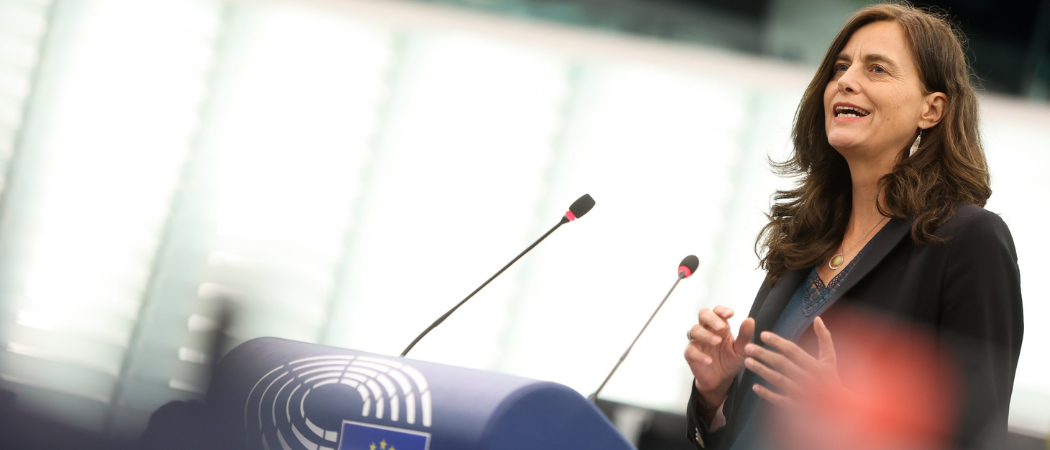Dedicated support appears to have been ditched in favour of funding artificial intelligence research. MEPs are protesting

Alexandra Geese, German Green MEP. Photo credits: Fred Marvaux / European Union
Plans by the European Commission to cut dedicated funding for a European open source software initiative and divert it to artificial intelligence have triggered a campaign in the European parliament to reinstate support.
Supporters of the Next Generation Internet (NGI) initiative, which hands out small grants to help open source software projects, say it’s an essential counterweight for citizens and businesses that want to avoid relying on US and Chinese technology companies.
“This is exactly what Europe needs, to remain independent of big tech,” said Alexandra Geese, a German Green MEP who is fighting to have dedicated funding for NGI put back into next year’s Horizon Europe work programme.
NGI was established five years ago with support from Horizon 2020. Since then, it has supported more than 1,200 software projects, distributing around €140 million, often in small-scale, cascade grant, according to a recent report.
The aim is to create a “human-centric internet aligned with European values” – in other words, backing software projects that offer privacy-preserving alternatives to private US or Chinese companies. NGI has funded messaging platforms, identity systems, search tools and cybersecurity applications, for example.
Part of the point is to create tools that enable companies to comply with EU legislation, such as the General Data Protection regulation, or the Digital Services act. The creators of Mastodon, the social media product that has emerged as an alternative to X (formerly Twitter), have said that early NGI funding was “crucial” to get the project off the ground, and urged the EU to continue funding the initiative.
The Horizon Europe work programme for 2023-24 included €27 million funding for NGI.
But alarm bells have been ringing in the open software community after a circulating draft work programme for 2025, seen by Science|Business, failed to include a dedicated call to support NGI.
Open software is “the corner of our infrastructure”, said Alexander Sander, a policy consultant for the Free Software Foundation Europe, a charity which is a partner of NGI. “To have digital sovereignty […] we need to invest in these core tools.”
Digital or technology sovereignty has risen up the Brussels agenda in recent years as the EU worries it has become too dependent on the US and China for things like search tools, batteries and solar panels.
In September, returning Commission president Ursula von der Leyen doubled down on this focus, nominating for the first time an executive vice president for tech sovereignty, Henna Virkkunen, who will also look after democracy and security.
“We can achieve so much with tiny funds,” argued Sander. “It’s a few million euros. It’s not like we are talking about billions.”
Fight with AI
Several open software advocates say they have been told that dedicated funding for NGI has been diverted to AI projects, as the EU frets about falling behind the US and China.
Geese said that while she was supportive of European AI research, the pendulum had swung too far. “Shifting all the money to AI because it’s the new kid on the block is not that intelligent,” she said.
Sander concurred, pointing out that AI is already handsomely funded.
Asked whether NGI funding had been scrapped in favour of AI projects, a Commission official did not directly respond. “AI-related projects are indeed important as set out by President von der Leyen in her political guidelines but funding for other digital initiatives will also be carried out,” they said.
Parliamentary tussle
In early September, Geese added an amendment to a Horizon Europe budget vote in support of NGI funding, but it failed, in part due to opposition from centre-right European People’s Party (EPP) MEPs.
A source close to Christian Ehler, an EPP MEP focused closely on Horizon Europe, said that EPP MEPs voted against Geese’s amendment not because they opposed funding for NGI, but rather because influencing specific calls through the budget process should be a last resort. Other channels should first be used to influence the work programme, they stressed.
Geese now plans to continue campaigning for NGI funding in parliamentary committees, and when MEPs grill candidate commissioners in hearings that should take place in November or December.
Sprinkled elsewhere
Of course, the 2025 work programme is still in a draft stage, and could be changed before being officially published next year.
“Draft versions are currently discussed with the different configurations of the Horizon Europe programme committee,” a Commission official said.
“The timeline is not fully confirmed but there will more discussions with the committee configurations until the formal adoption of the work programme 2025, which is tentatively planned for Q2 2025,” the official added.
The official said the Commission “takes good note of the support for the next generation internet programme from various communities” and would “continue to support open source solutions and the community supported in the NGI programme.”
The Commission has said it wants to “sprinkle” money for open software in other calls, said Sander.
But this risks making applications overly bureaucratic, if software projects have to apply directly to Horizon Europe, rather than just getting small grants from NGI. “It's not easy to become a Horizon research partner for these projects,” Sander said.





 A unique international forum for public research organisations and companies to connect their external engagement with strategic interests around their R&D system.
A unique international forum for public research organisations and companies to connect their external engagement with strategic interests around their R&D system.